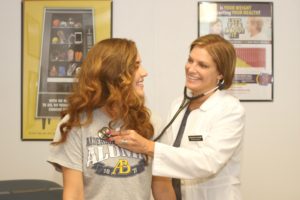Cancer sucks- These affordable screening options don't

The month of October is nationally recognized as Breast Cancer Awareness Month and is a campaign designed to increase awareness of the disease. Though it’s important every month of the year to be aware of the signs of breast cancer, October is a great time to remind yourself and the women in your life to get screened by a provider.
While getting a mammogram may seem intimidating and expensive, Barbour Community Health Association (BCHA) offers several options for women who need financial assistance.
According to Debbie Schoonover, Chief Operations Officer, BCHA offers many affordable options for women to get screened annually, here are two:
One option is the West Virginia Breast and Cervical Cancer Program. Depending on their risks and age, most of these visits are free for our women,” said Schoonover. Through this program, women can be screened through a pap smear and a mammogram exam. The second affordable way women can be checked for breast cancer is through Bonnie’s Bus Mobile Mammography Unit, which visits two to three times a year. Bonnie’s Bus accepts most insurances, just like the WV Breast and Cervical Program, and has some private funding for women who qualify. “We’re able to bridge the gap between transportation barriers and affordable health screenings for women,” said Schoonover. “And it creates a better atmosphere for wellness here in Barbour County.”
October is the perfect time to get screened and raise awareness about Breast Cancer. It’s also a time to recognize those battling breast cancers, survivors, and those we have lost to the disease.
Check with your provider for screening options and information on financial assistance.
Medicare Made Simple: Your Guide to Understanding Healthcare
Medicare Made Simple: Your Guide to Understanding Healthcare Navigating the complexity of Medicare can be a lot. In this blog, we will break down
Barbour Community Project Assists Patients
Barbour Community Project Assists Patients It’s no secret that Barbour County is a close-knit community that Barbour Community Health Association (BCHA) is proud to
Healthy Eating Habits for Toddlers with Rachel Williams, MS
Healthy Eating Habits for Toddlers with Rachel Williams, MS As your baby becomes a toddler, he or she may begin to display some very





